Inspiring Change: Telecare's Commitment to NAMIWalks
/Join Telecare on a journey of hope and advocacy as employees like Juanita and Meg embrace the spirit of the Annual NAMI Walk fundraiser.
Read MoreJoin Telecare on a journey of hope and advocacy as employees like Juanita and Meg embrace the spirit of the Annual NAMI Walk fundraiser.
Read MoreRead about Telecare's CEO and President Anne Bakar's captivating journey as she explored our Oregon programs. From the vibrant stories of dedication to the seamless integration of services, discover what takes place in our Oregon programs. Dive into the story and be inspired by tales that define our commitment to excellence!
Read More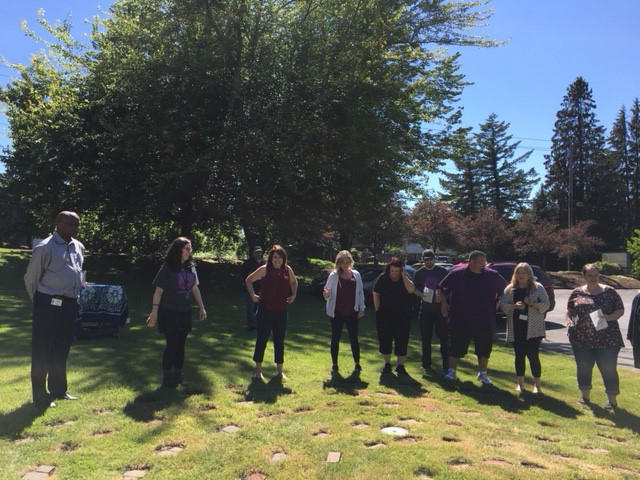
The team at Telecare's Recovery Center at Gresham view their completed labyrinth on the east lawn of their campus.
At Telecare, the program environment is a foundational part of our recovery model. This means we strive to create environments that are inclusive, welcoming, and create a space where recovery can thrive.
Telecare's Recovery Center at Gresham program in Oregon recently added a unique feature to their recovery environment : a wellness labyrinth created with staff and resident participation.
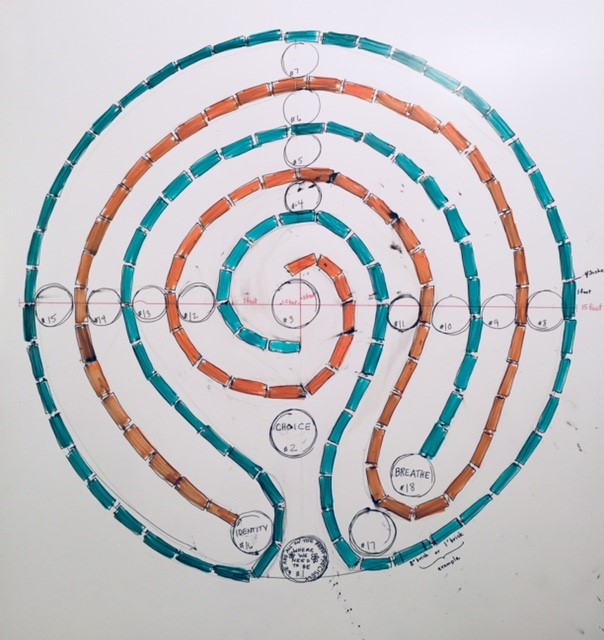
The Labyrinth design.
When you visit the Gresham campus, you will find a low-profile design with handcrafted stepping stones interspersed with pavers. The design, created at the direction of art therapy intern, Glee Lumb, is conducive to mindfulness and taking time for reflection and serenity in a fast-paced world.
Labyrinths have long been used as a tool for mindfulness and meditation all over the world. A specific path is laid out to create a structured walking meditation that offers a pattern thought to enhance the right-brain activity. Walking the path can be a relaxing, often spiritual experience, which aids our members to safely and gently explore their own thoughts, emotions and memories as well as practice a new form of grounding and being.
Research shows that labyrinths can offer other common benefits, including:
Creating greater awareness of thoughts, emotions, and memories
Reducing stress, agitation, and anxiety
Replenishing energy
Creating more clarity, focus, and peacefulness
Decreasing somatic stress and worry
Stabilizing blood pressure, gain higher physical and mental relaxation
Improving overall wellness and health
Nurturing a spiritual connection to the earth and a higher power
Aiding in the practice of letting go and living one day, one step at a time

Oxbow Regional Park, Multnomah County, OR. Photo by Ilya Yakubovich/Flikr
In March, the staff at Telecare's Recovery Center at Gresham program in Oregon enjoyed a fun and recovery-centered retreat at the YMCA Camp Collins alongside Oxbow Regional Park in Multnomah County.
This was the second annual retreat for the Gresham team. Each year, they break into groups for single-day trips away in the woods to take advantage of the majestic landscapes Oregon has to offer. The days are filled with activities that incorporate some "awarenesses" from Telecare's Recovery-Centered Clinical System (RCCS), a clinical approach to recovery that puts respect, nonjudgment, and power-awareness at the forefront of treatment.
"As an office coordinator, the role-playing definitely connected me to the everyday issues recovery specialists, nurses, and peers are facing," said Don, Office Coordinator at Gresham. "I liked the peripatetic meetings: it was good to walk and talk, especially in nature."
"We really focused a lot on power-awareness and discussed possible scenarios that can often lead to power struggles, which we obviously want to avoid," said Rachel, Medical Records Technician. "I have worked here a long time so it is amazing to see that this list has diminished greatly."
Read more about the RCCS in action and download some available resources by clicking here.
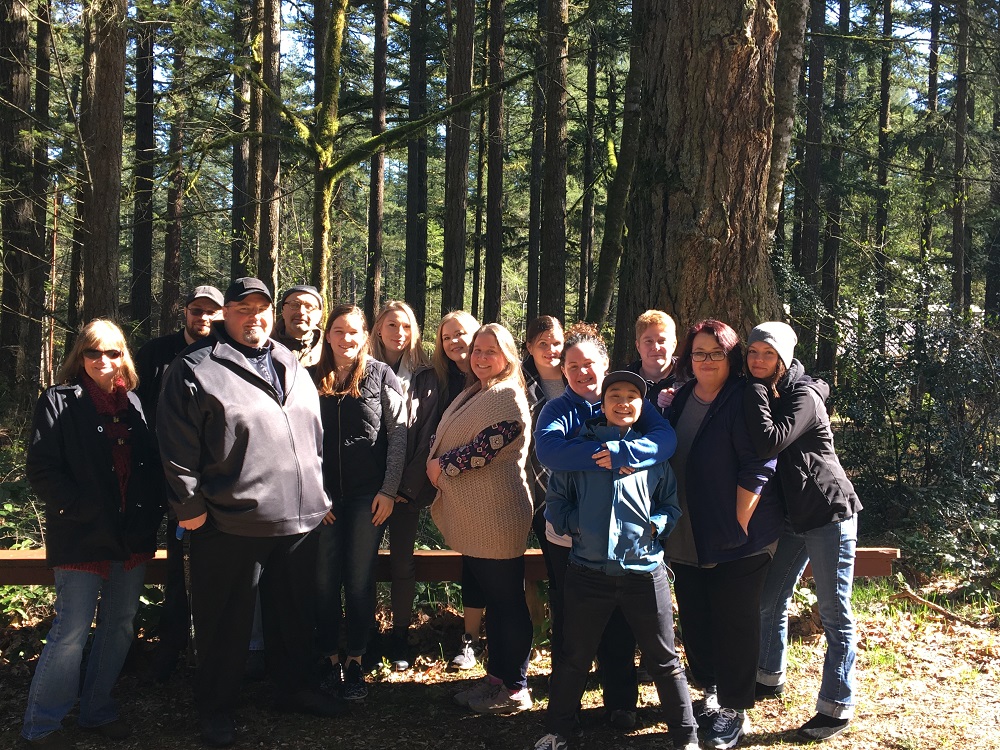
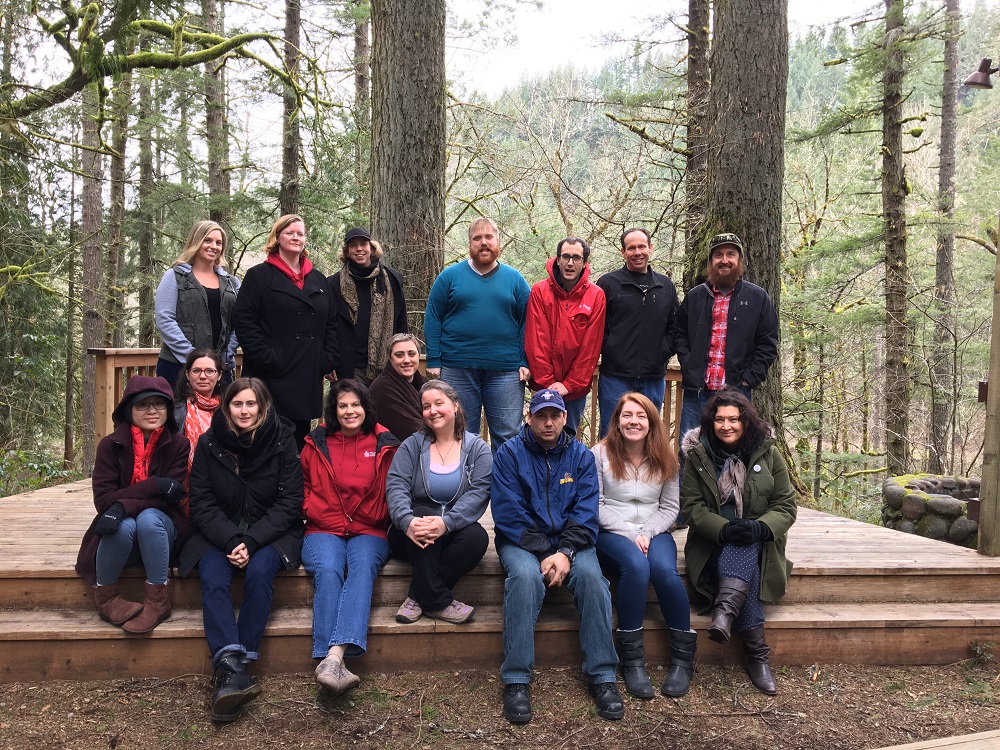
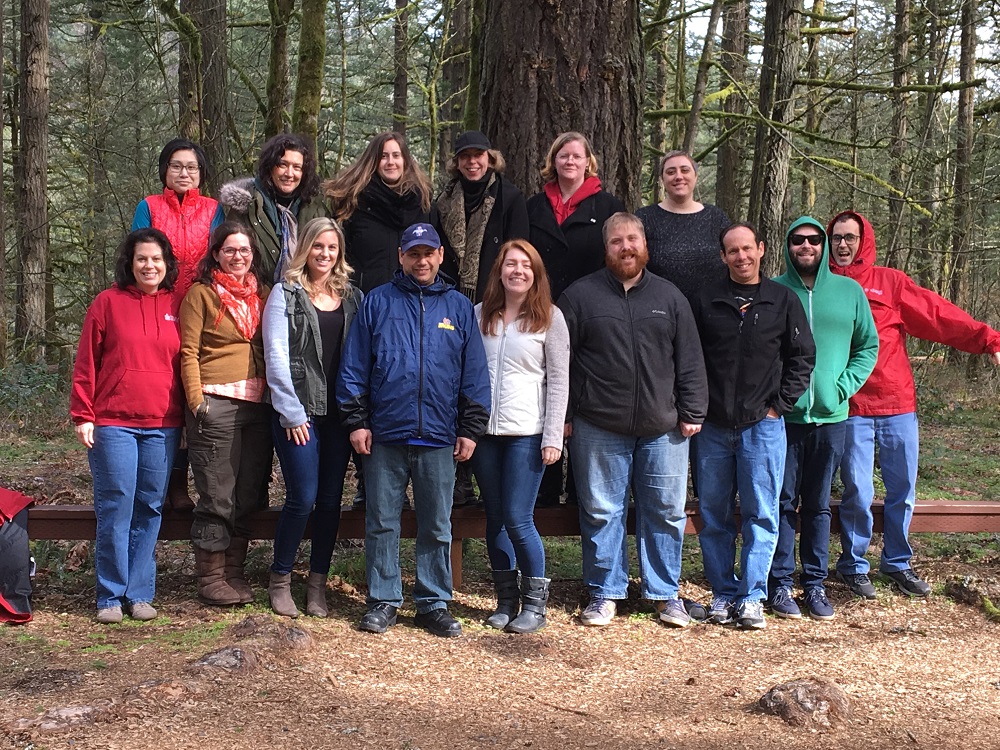
In 2002, Telecare rolled out the Recovery-Centered Clinical System (RCCS), an innovative clinical approach to delivering mental health services that we developed in the course of 20 years. Below, we've outlined a few highlights for you to learn more about the basic structure of the RCCS and what it looks like at our programs.
The RCCS promotes culture as a primary intervention. It addresses losses brought on by years of living in and being served by “power-over” systems and living in the greater dominant culture. The goal is to create increased awareness and behaviors that reverse the loss of power, judgment, motivation, individual uniqueness, and respect and dignity.
The RCCS has five conversation areas to help engage staff with clients and begin building relationships that will support an individual’s recovery journey. Staff use conversational tools to help re-awaken hope and support people in resuming their unique recovery journeys. Find more details about the five conversation areas by downloading our Culture & Conversations: The Basic Framework of RCCS handout.
The Recovery Centered Measures (RCM) is a validated tool that Telecare programs use to measure their recovery-centered culture. Staff as well as individuals served give feedback on how the culture impacts them and services being delivered. Results are used to identify and grow strengths within a program as well as provide an opportunity for culture improvement initiatives.

From the development of programs to the delivery of services, the "awarenesses" of the RCCS show up in all sorts of ways. The model continues to evolve with our industry and is adaptable to the many types of programs we have. Our programs also serve a wide array of populations, and to be the most effective we need to have strong partnerships with our customers, communities, and the individuals we serve.
Recovery awaits at the King County Evaluation and Treatment Center in Federal Way, WA.
High ceilings, natural light, and comfortable furniture help create a welcoming environment at Telecare's Lagos program in Riverside, CA.
Murals cover the walls at our Recovery Center @ Gresham facility in Gresham, OR.
Recovery-Centered Environment
To support the RCCS, Telecare designs its programs to create an environment where recovery can thrive. When a person chooses to walk through the doors of one of our programs, our goal is to welcome them to a home-like space where they feel safe and supported. We use art and color to inspire tranquility and mindfulness. Our nursing stations are typically open, not enclosed, to promote inclusivity and engagement with residents.
Resilience in the Workplace
While we know the work we do can be both rewarding and inspiring, it can also be demanding and stressful. It was Maya Angelou who said it best: "Nothing works unless you do."
Finding a self-care practice for healing from or managing these stressors at work is essential for the wellbeing of staff, as well as for those they are supporting in recovery. Telecare staff use the RCCS's guided conversations and our Staff Resiliency Toolkit to build relationships with each other based on trust, teamwork, and wellness.
Showing Up and Being Present
We believe recovery is all about partnership—we partner with our members, our customers, and our local communities to ensure we do whatever it takes to engage individuals in our services and deliver the best possible outcomes.
Training for Staff and Leaders
Telecare is committed to creating programs where recovery thrives and where culture is sustained to reinforce the values and principles of the RCCS. With that in mind, we have designed a robust training program for all staff and leaders of the organization. These trainings target new Telecare staff by introducing them to the two components of the RCCS: the program culture with its five awarenesses, as well as the five conversations of the RCCS.
In addition, clinical supervisors attend in-person trainings that dive deeper into the five conversations: exploring identity, awakening hope, making choices, reducing harm, and making connections. These trainings help clinical supervisors develop their understanding of the intent and purpose of each RCCS conversation; understand the characteristics of being a good mentor, including giving and receiving feedback; learn and practice a strategy for skill building practice using a coaching feedback tool; and learn treatment/service planning using the RCCS conversations as targeted interventions.
Additionally, program leaders attend the annual "RCCS for Leaders" training. This in-person training helps leaders develop skills to evaluate where and how the program practices exert power and control, and how to evaluate when and how to safely increase authentic control. Leaders also understand their role in facilitating the importance of staffs rituals that build hope and resilience.
Check out some resources we developed for the RCCS by clicking the links below!
If you'd like more information about our RCCS, tools we use to measure recovery culture, or related presentations and materials, please email: RCCSusage@telecarecorp.com.
Our Gresham Telecare team enjoyed an all day staff retreat at YMCA Camp Collins which is in Oxbow Park. We had a speaker come in to talk with us about effective communication, she was very informative! We then took a hike through the woods and along the Sandy River. We found several interesting things on our hike including a ropes course, we may have stopped and had a little fun swinging around! The building we were in (Jesse’s Lodge is one of many buildings they have at the camp), had windows all around it so we got to enjoy the view all day. That is when we all took a short break to look at the beautiful deer right outside our windows, they were so close to us we all had to stop and check them out!
Lena then lead an exercise “Getting to know you”, where we all shared about ourselves and learned new things about one another. Salena then presented some RCCS information that we all discussed together. Jen closed the retreat with “Next steps” where we spent time addressing our program, how we can improve, changes we want to make, and we discussed a list of suggestions from the residents obtained during a recent discussion group. It was a wonderful, productive, informative, and fun filled day!!
(L-R) Top Row: Bridget Murray, Recovery Specialist; Rachel Severson, Medical Records; Chad Hamilton, Recovery Specialist; Tim Leewehage, Recovery Specialist, the one with his hands up; Amy Lugo, HR Coordinator; Lena Witkowski, Nursing Coordinator; Brinda Peterson, Lead Housekeeper.
(L-R) Bottom Row: Jordan Simpson, Recovery Specialist and Jen Obermeyer, Administrator. Photo by Salena Schwartz, Clinical Director.
(L-R)Top Row: David Nez, Recovery Specialist; Cirsten Kimball, Recovery Specialist; Salena Schwartz, Clinical Director; Sharon Aumani, RN; Angela Gilleran, Recovery Specialist; Joyce Bailey, Recovery Specialist; Steve Ryniker, Housekeeper; Vieve, Art Therapist; Jacob Jonas-Closs, Recovery Specialist; Sarah Gracey, BOM; JoAnna WIlliams, Recovery Specialist; Petr Penkov, Housekeeper.
(L-R) Bottom Row: Jen Patterson, Admit/Discharge Coordinator; Jenny Siemens, RN; and Barbara Lee, Recovery Specialist.
50 Years of Services to People With Serious Mental Illness
©2018 Telecare Corporation. All rights reserved.